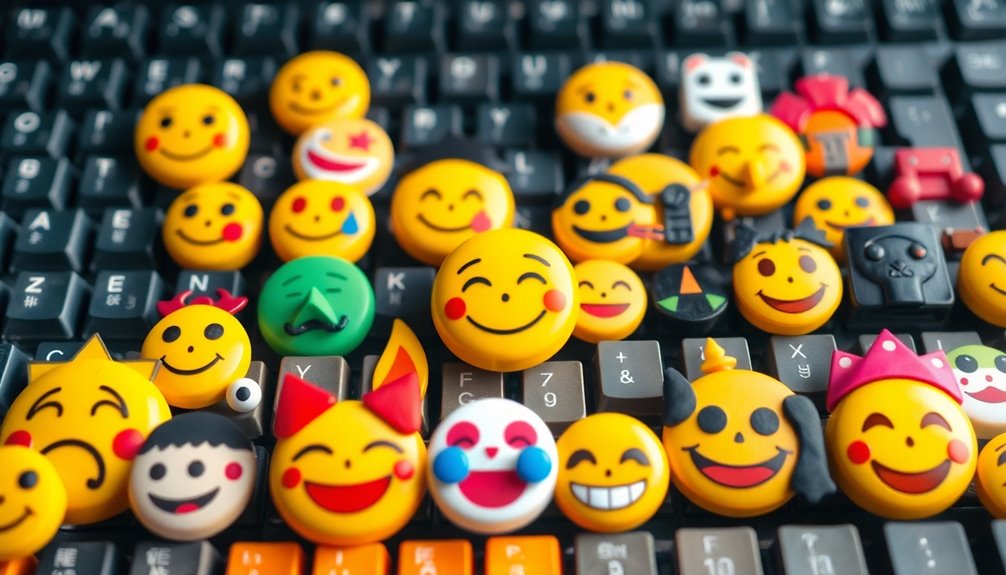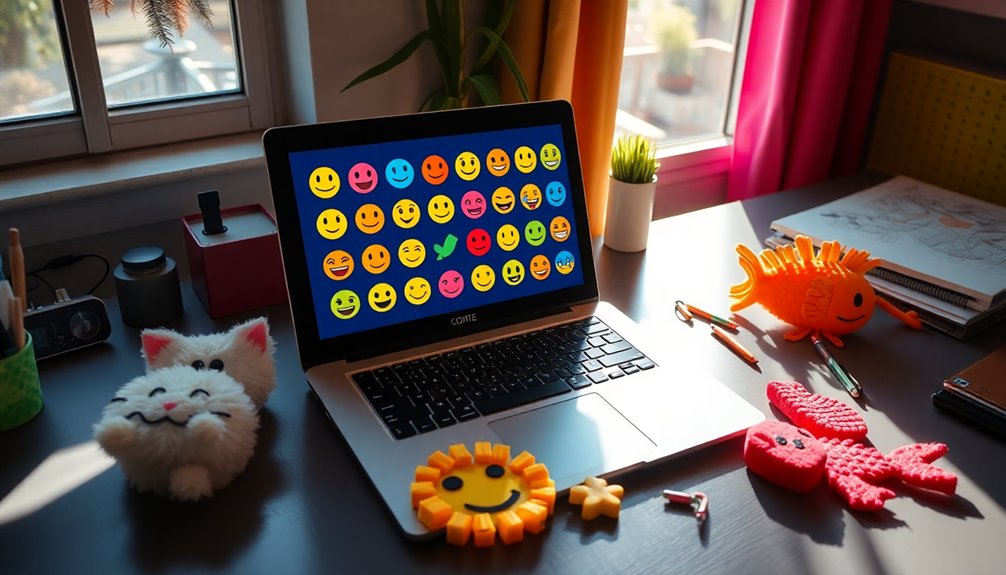You can express various emotions, animals, and objects with simple characters on your keyboard to create engaging emoticons. For basic faces, try using ":)" for a smile or ":(" for a frown. Want to add some playful animals? Use "=^.^=" for a cat or ":o3" for a dog. You can even represent objects by combining symbols creatively. Custom emoticons add your personal flair, enhancing conversation. With the rise of social media and messaging apps, emoticons help clarify messages and lighten the mood. Discovering more emoticons can enrich your digital communication experience and keep your chats lively.
Key Takeaways
- Basic facial emoticons like 🙂 and 🙁 effectively convey emotions in digital conversations.
- Animal emoticons such as =^.^= for cats and :o3 for dogs add playfulness to messages.
- Combine keyboard symbols creatively to design custom emoticons that reflect personality.
- Experiment with alignment and spacing to enhance the appearance of your emoticons.
- Utilize online tools for easy generation and sharing of unique emoticons in chats.
Understanding Emoticons
Emoticons, those charming keyboard creations, serve as a quick and effective way to express emotions in digital conversations. You can easily convey feelings like happiness, sadness, or surprise using simple combinations of characters.
These text-based representations originated in the 1980s and gained popularity with the rise of instant messaging and social media. By adding emotional context to your messages, emoticons enhance your textual communication, making it clearer and more relatable.
While basic emoticons like 🙂 for a smile or 🙁 for a frown are widely recognized, you can also explore more complex expressions. Understanding how to use emoticons effectively can enrich your interactions and help you connect with others in a fun, engaging way. Additionally, effective communication skills can significantly enhance your ability to express emotions and connect with others, both online and offline.
Tips for Creating Emoticons

Creating emoticons can add a personal touch to your messages, making them feel more vibrant and engaging. To start, keep your characters close—avoid spaces between them. Use underscores by holding Shift + hyphen when needed.
If you want to create bullet points, use Alt + 7 on a PC or Option + 8 on a Mac. Familiarizing yourself with keyboard shortcuts can greatly boost your efficiency.
Remember, practice makes perfect; the more you try, the better you'll get at crafting emoticons. Simple designs work best, as they're easily recognizable across various platforms.
Don't hesitate to experiment with different combinations to express your emotions uniquely. Have fun and let your creativity shine through your emoticon creations!
Basic Facial Expressions

Facial expressions play an essential role in conveying emotions through keyboard symbols. You can easily express a range of feelings with basic emoticons.
For a smile, type ':)' or ':-)'; for a frown, use ':(' or ':-('. If you're feeling playful, a simple wink can be represented by ';)' or ';-)'. A surprised face is as easy as ':O' or ':-O', while an angry expression can be shown with '>:(' or '>:-('. Understanding these symbols can significantly enhance your digital communication skills.
These basic emoticons aren't just recognizable; they add depth to your digital conversations. Mastering these simple symbols allows you to communicate emotions effectively, enhancing your online interactions and making your messages more engaging. Additionally, using emoticons can foster social connections and strengthen relationships in your digital communication.
Animal Emoticons

Animal lovers can express their affection through playful keyboard characters that represent various creatures. You can create adorable animal emoticons to add a fun touch to your messages.
For instance, type '=^.^=' for a cute cat, or ':o3' to represent a dog. Want to show a bird? Use '(*V*)', or if you're feeling fishy, try '<><'. For a rabbit, simply type '(^-^)'.
You can also express a pig using '=8)', a bee with ':(III)-', or an owl with '^o,o^'. Don't forget the penguin, represented as '( * )', and a mouse with ':3)~'.
These charming emoticons allow you to convey your love for animals in a creative way, making your conversations more lively and engaging!
Object and Symbol Emoticons
Emoticons can also represent various objects and symbols, adding a playful element to your digital conversations. You can express yourself creatively with simple combinations of keyboard characters. For example, a birthday hat is represented as '*:)', while a gift can be shown as '8[+]'. If you want to share your love for cycling, use '(*)/(*)' for a bicycle, or '-|' for an airplane. Seasonal symbols like a Christmas tree '*=' or a rose '@~)~~~~' can brighten up your messages. You can even celebrate with a cupcake '*^_^*'. These object and symbol emoticons enhance your texts, making them more fun and engaging. So go ahead and experiment with these delightful representations in your chats!
Emoticon Art
Creating emoticon art is a fun and expressive way to showcase your creativity using keyboard characters. You can craft intricate designs by combining different emoticons. Here's a simple example of how you can create a cute face using a table format:
| ^_^ | O | ^_^ | |||
| __/ | __/ | ||||
Experiment with various characters to create your own unique designs. Share your creations online and inspire others to explore emoticon art, blending imagination with the simplicity of keyboard characters!
Communication With Emoticons

Crafting emoticon art can spark creativity, but communicating with emoticons goes beyond mere decoration. They're powerful tools for expressing emotions in your messages. When words fall short, a simple smiley face or a sad emoticon can convey feelings instantly, enhancing your communication. Incorporating mindfulness practices while using emoticons can help you be more intentional about the emotions you wish to share.
You can lighten the mood with a wink or express surprise with an open-mouthed emoticon. Using these symbols also helps clarify your intent, reducing misunderstandings in digital conversations.
Whether you're chatting casually with friends or keeping it professional, emoticons add a personal touch that words sometimes lack. Embrace them to connect better with others, making your digital interactions more engaging and relatable. Additionally, using emotional alignment can help ensure that your emoticons resonate with the feelings you wish to convey.
Cultural Differences

In today's digital landscape, understanding cultural differences in emoticons can enhance your communication considerably.
For instance, Japanese kaomoji, like (^_^), convey a wider range of emotions and often appear more expressive than their Western counterparts, which tend to be simpler, like 🙂 or :(.
Different cultures may interpret the same emoticon differently; what seems playful in one culture might be considered disrespectful in another.
By recognizing these nuances, you can avoid misunderstandings and connect more deeply with your audience.
As globalization continues to blend these styles, embracing both traditional and modern emoticons can enrich your communication.
Ultimately, being mindful of cultural variations helps you express yourself more effectively in a diverse digital world.
Emoticons and Mental Health
How can emoticons impact mental health? Emoticons serve as essential tools for expression, especially when words fall short. They can create a sense of connection and reduce feelings of isolation.
Here are three ways emoticons aid mental health:
- Emotional Expression: They allow you to convey feelings like joy, sadness, or frustration, helping to articulate emotions that might be hard to express verbally.
- Community Building: In online support groups, emoticons foster a sense of belonging and understanding, making it easier to relate to others facing similar challenges.
- Mood Enhancement: Using playful or positive emoticons can lighten the mood and promote a more optimistic outlook in conversations, offering a mental boost when needed.
Evolution of Emoticons
As technology advanced, so did the way we communicate emotions through text, leading to the evolution of emoticons. You've likely noticed how simple text characters like 🙂 or 🙁 transformed into more complex combinations over the years.
Early emoticons paved the way for graphical emojis, which added color and detail to your expressions. With the rise of mobile devices, you've seen an increased demand for more diverse options, reflecting your feelings and preferences. The development of machine learning has also contributed to creating more personalized emoticons that resonate with users. Additionally, the integration of AI technologies has allowed for real-time generation of emoticons that adapt to user preferences.
Emoticons adapted continuously, becoming more intricate as language and technology merged. Today, they're more than just faces; they represent objects, animals, and even entire scenes, enhancing your digital conversations. The rise of natural language processing has also played a role in creating more contextually relevant emoticons, making digital interactions feel even more personal.
The future promises even more exciting developments, as emoticons evolve alongside user needs and technological advancements.
Popular Emoticon Platforms
With the rise of mobile devices and the evolution of emoticons, various platforms have emerged that allow users to express themselves more vividly.
You'll find emoticons popping up everywhere, enhancing your digital conversations.
Here are three popular platforms where emoticons thrive:
- Social Media: Platforms like Facebook and Twitter use emoticons to add emotion to posts, making interactions more relatable.
- Messaging Apps: WhatsApp and Telegram let you spice up your chats with emoticons, making them more fun and engaging.
- Gaming Communities: Many online games incorporate emoticons, allowing players to convey emotions and reactions during gameplay.
These platforms not only enrich your communication but also create a deeper connection in your interactions. Additionally, the growth in freelance platforms for various job seekers illustrates how digital expression continues to evolve across different sectors.
Custom Emoticon Creation

Creating custom emoticons can be a fun and rewarding way to express your personality in digital communication. You can design unique emoticons by combining various keyboard symbols and characters.
Start by thinking about the emotions or themes you want to convey. For example, use parentheses and other symbols to create faces or objects that reflect your mood. Experiment with spacing and alignment to achieve your desired look.
There are also online tools available that help you generate custom designs with ease. Once you've crafted your emoticon, share it with friends or use it in your messages to add a personal touch.
Embrace your creativity and let your custom emoticons enhance your digital conversations!
Emoticons in Marketing
Emoticons have burst onto the marketing scene as a powerful tool for engagement and expression.
You can leverage them to create a relatable brand voice and simplify complex messages. Here are three ways emoticons can benefit your marketing strategy:
- Enhance Social Media Engagement: Emoticons make posts more visually appealing and can boost interaction rates. The use of intelligent systems can also enhance how emoticons are utilized in marketing campaigns. Additionally, incorporating diversification strategies can help brands reach a broader audience through varied emoticon use. Engaging with audiences in a more personal way can help eliminate distractions and keep their attention on your brand. By analyzing user interaction, brands can utilize predictive modeling to tailor their emoticon usage for maximum impact.
- Convey Emotion Quickly: They help express feelings and brand personality in just a few characters, making your message clearer.
- Measure Audience Reactions: By analyzing how users respond to posts with emoticons, you can gain insights into what resonates with your audience.
Additionally, with the rise of AI integration in smartphones, emoticons can be personalized based on user preferences, making communication even more effective. This technology allows users to create emoticons that reflect their unique style, mood, or even cultural background, fostering a deeper level of self-expression. By leveraging smartphone tips and resources, individuals can unlock hidden features and optimize their devices to create a more engaging and intuitive communication experience. As AI continues to evolve, the possibilities for enhancing digital interactions through personalized emoticons are virtually limitless.
Incorporating emoticons into your marketing can foster connections and elevate your brand's online presence.
Accessibility of Emoticons
Accessibility in digital communication is essential, and emoticons play a significant role in making interactions more inclusive. They help convey emotions for non-verbal individuals, allowing them to express feelings without needing extensive vocabulary.
Emoticons can replace words in conversations, making communication easier for everyone, including those with cognitive or language challenges. By using simple symbols, you can enhance understanding and engagement across diverse audiences.
Additionally, ongoing research aims to optimize emoticon usage strategies for accessibility, ensuring that everyone can participate in digital dialogues. Recent studies indicate that effective communication methods can significantly improve interaction quality among users with varying abilities.
As you incorporate emoticons into your messages, remember their power to bridge communication gaps and foster connections, making your conversations richer and more relatable for all.
Future Trends in Emoticons
As technology continues to evolve, you can expect emoticons to adapt in exciting ways. The future of emoticons holds intriguing possibilities that could enhance your digital expressions.
Here are three trends to watch for:
- AI-Driven Emoticons: Personalized emoticons may emerge, generated based on your mood and communication style, making your interactions feel more authentic.
- Integration with VR and AR: Emoticons could become more immersive, allowing you to express yourself in virtual environments with 3D animations and gestures.
- Cultural Adaptation: As global communication increases, expect emoticons to reflect diverse cultural expressions, bridging gaps and enhancing understanding across platforms.
These advancements promise to make your online conversations even more engaging and meaningful.
Frequently Asked Questions
Can Emoticons Be Used in Professional Emails Effectively?
Yes, you can use emoticons in professional emails effectively. They can lighten your tone and convey friendliness. However, make certain they're appropriate for your audience and context to maintain professionalism and clarity in communication.
Are There Specific Emoticons for Different Holidays?
Ever wondered if there are specific emoticons for holidays? Absolutely! You can use festive emoticons like Christmas trees (*=), hearts for Valentine's Day (<3), or pumpkins for Halloween (🎃) to celebrate each occasion creatively!
How Do I Make Animated Emoticons?
To create animated emoticons, you can use GIFs or animation software. Choose your design, animate it frame by frame, and export it as a GIF. Share it on messaging platforms for fun, dynamic expressions!
What Are the Best Practices for Emoticon Use in Marketing?
To maximize emoticon effectiveness in marketing, keep it relevant, use sparingly, and tailor to your audience. Emoticons can enhance engagement, simplify messages, and create a relatable brand voice when applied thoughtfully.
Can Emoticons Replace Traditional Language in Digital Communication?
Imagine a painter using colors instead of words; emoticons can add vibrancy to your digital conversations. While they enhance expression, they can't fully replace traditional language, as nuance and depth often require more than symbols.
Conclusion
Incorporating emoticons into your digital conversations can truly elevate your communication. Did you know that 92% of online users regularly use emoticons to express emotions? These little characters not only add personality to your messages but also help bridge gaps in understanding. So go ahead, release your creativity and make your chats more vibrant and fun! Whether it's a smiley face or a cute animal, emoticons are sure to bring a smile to both you and your friends.









